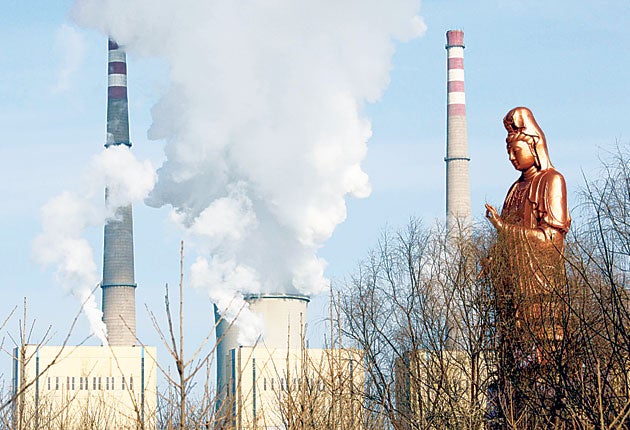China’s power stations generate ‘future spike’ in global warming

Sulphur pollutants from coal-fired power stations in China have tended to cool the global climate over the past decade in contrast to the warming effect resulting from rising concentrations of carbon dioxide and other greenhouse gases, scientists have found.
A study has shown that the levelling of global average surface temperatures between 1998 and 2009 can be explained by the cooling effect resulting from the sulphur-containing gases emitted from mainly Chinese power stations over the same time period.
Although carbon dioxide emissions have risen during the past decade, surface temperatures have not followed the same rapid increase seen in the previous three decades, which has led some climate sceptics to suggest that global warming this century has "stopped".
However, a study by Robert Kaufmann, of Boston University, and his colleagues has discovered that the levelling off of surface temperatures during this period can be explained by the sulphate particles released into the atmosphere from coal-burning power stations. This has the effect of reflecting sunlight and heat away from Earth.
"Humans affect the climate in two ways. They warm it by emitting carbon dioxide and other greenhouse gases and they cool it by emitting sulphur in the form of sulphate particles which have the effect of reflecting sunlight," Dr Kaufmann said.
"The rapid growth of the Chinese economy over the past decade and the amount of coal they used to fuel it has tended to cool the climate, which offset to some extent the warming effect of carbon dioxide emissions," he said.
"This means that taken together, humans have had relatively little effect overall on global average surface temperatures over the 10 years, which means that natural fluctuations have predominated," he added.
Between 1998 and 2007, Chinese power stations doubled the amount of coal they burned, from 1,392 million tons to 2,892 million tons. Many plants did not have clean-air "scrubbers" to take out sulphur-containing pollutants. The study, published in the journal Proceedings of the National Academy of Sciences, points out that 1998 was an exceptionally warm year because of El Nino, a Pacific Ocean climate phenomenon that tends to warm the global climate. After 1998, global surface temperatures showed little warming until 2009, when they rose again.
The scientists used a computer model of the climate to show that natural fluctuations, such as variations in solar activity as measured by the record low in sunspots, cannot on their own explain the observation.
Simon Lewis, of the University of Leeds, said that the study could be easily misinterpreted: "While sulphur emissions do have a cooling effect, this is only short-term. Meanwhile, the carbon dioxide emissions will lead to a long-term planetary warming."
Join our commenting forum
Join thought-provoking conversations, follow other Independent readers and see their replies
Comments
Bookmark popover
Removed from bookmarks